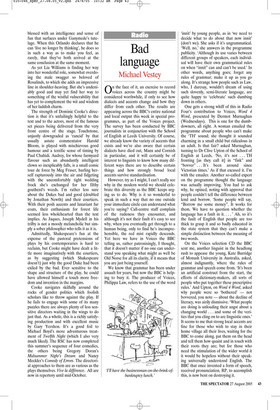Bad language
Michael Vestey
On the face of it, an exercise to record voices across the country might be considered worthwhile, if only to see how dialects and accents change and how they differ from each other. The results are appearing across the BBC’s entire national and local output this week in special programmes, as part of the Voices project. The survey has been conducted by BBC journalists in conjunction with the School of English at Leeds University. Of course, we already know the variety of accents that exists and we’re also aware that certain dialects have died out, Manx and Cornish in particular, and it will certainly be of interest to linguists to know how many different ways there are to describe certain things and how strongly broad local accents survive standardisation.
However, try as I might, I can’t really see why in the modern world we should celebrate this diversity as the BBC keeps urging us to do. Why is it so wonderful to speak in such a way that no one outside your immediate circle can understand what you’re saying? Call-centre staff complain of the rudeness they encounter, and although it’s not their fault it’s easy to see why, when you eventually get through to a human being, only to find he’s incomprehensible, the red mist rapidly descends. Yet here we have in Voices the BBC telling us, rather patronisingly, I thought, that it doesn’t matter if no one can understand you speaking what might as well be Old Norse for all its clarity, if it means that you are just being yourself.
We know that grammar has been under assault for years, but now the BBC is helping to bury it. The producer of Voices, Philippa Law, refers to the use of the word ‘innit’ by young people, as in ‘we need to decide what to do about that now innit’ (don’t we). She asks if it’s ungrammatical. ‘Well, no,’ she answers in the programme publicity. ‘Although its use varies between different groups of speakers, each individual will have their own grammatical rules on when “innit” can and can’t be used.’ In other words, anything goes; forget any rules of grammar; make it up as you go along. It’s strange how people such as Law, who, I daresay, wouldn’t dream of using such slovenly, semi-literate language, are quite happy to ‘celebrate’ such dumbing down in others.
One gets a strong whiff of this in Radio Four’s contribution to Voices, Word 4 Word, presented by Dermot Murnaghan (Wednesdays). This is one for the dumbdowners, all right. A woman emailed the programme about people who can’t make the ‘TH’ sound; she thought it sounded charming in a small child but ridiculous in an adult. Is that fair? asked Murnaghan, turning to Dr Clive Upton of the School of English at Leeds, ‘No, it’s not ... TH fronting [as they call it] in “fink” and “bovver” .. . It’s been around since Victorian times.’ As if that excused it. I’m with the emailer. Another so-called expert on the programme thought the language was actually improving. You had to ask why, he opined, noting with approval that people couldn’t tell the difference between lend and borrow. ‘Some people will say, “Borrow me some money”. It works for them. We have to question whether the language has a fault in it.... ’ Ah, so it’s the fault of English that people are too thick to grasp it and so badly educated in the state system that they can’t make a simple distinction between the meaning of two words.
On the Voices selection CD the BBC sent me, another linguist in the headlong rush to appease the young, Kate Burridge of Monash University in Australia, asked, almost indignantly, where the rules of grammar and speech come from. ‘It’s been an artificial construct from the start, the efforts of dictionary-makers, all sorts of people who put together these prescriptive rules.’ And Upton, on Word 4 Word, asked why people were so ‘bothered’ — not bovvered, you note — about the decline of literacy, was airily dismissive. ‘What people are doing is unloading their angst about a changing world ... and some of the verities that you cling on to are linguistic ones.’ It seems to me that strong local accents are fine for those who wish to stay in their home village all their lives, waiting for the BBC to come along, pat them on the head and tell them how quaint and in touch with their roots they are; but for those who need the stimulation of the wider world it it would be hopeless without their speaking universally understood English. The BBC that once invented a form of speech, received pronunciation, RP, to accomplish this, is now bent on destroying it.











































 Previous page
Previous page